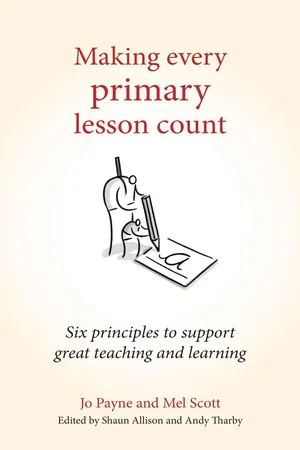
Making Every Primary Lesson Count
Six principles to support great teaching and learning (Making Every Lesson Count series)
- 168 pages
- English
- ePUB (mobile friendly)
- Available on iOS & Android
Making Every Primary Lesson Count
Six principles to support great teaching and learning (Making Every Lesson Count series)
About this book
InMaking Every Primary Lesson Count: Six Principles to Support Great Teaching and Learning, full-time primary teachers Jo Payne and Mel Scott share evidence-informed practice and gimmick-free advice for ensuring that every lesson makes a difference for young learners. Writing in the engaging style of Shaun Allison and Andy Tharby's award-winning Making Every Lesson Count, the book is underpinned by six pedagogical principles challenge, explanation, modelling, practice, feedback and questioning and provides simple, realistic strategies to develop a culture of growth and excellence with pupils. Jo and Mel advocate an approach designed to cultivate a growth mindset in the classroom and guide children towards independence: motivating both teachers and pupils to aim high and put in the effort required to be successful in all subject areas. The authors also offer tips from across the Early Years and Key Stages 1 to 2 phases on how to implement effective routines and procedures so that pupils are clear about what is expected from them in the classroom. Making Every Primary LessonCountis for new and experienced teachers alike. It does not pretend to be a magic bullet. It does not claim to have all the answers. Rather the aim of the book is to provide effective strategies to bring the six principles to life, with each chapter introduced by two fictional scenarios rooted in situations primary teachers typically encounter and concluding in a series of questions to inspire reflective thought and help you relate the content to your own practice. In an age of educational quick fixes and ever-moving goalposts, this precise and insightful addition to the Making Every Lesson Count series will have a high impact on learning in the classroom: enabling pupils to leave primary school as confident, successful learners equipped with the skills and knowledge required of them. Suitable for all Early Years and primary teachers.
Tools to learn more effectively

Saving Books

Keyword Search

Annotating Text

Listen to it instead
Information
Challenge

Challenge – What It Is and Why It Matters



1. Be Precise
How do I cultivate a classroom culture of challenge through the routines and language I use?

Table of contents
- Cover
- Praise
- Title Page
- Acknowledgements
- Contents
- Introduction
- Chapter 1: Challenge
- Chapter 2: Explanation
- Chapter 3: Modelling
- Chapter 4: Practice
- Chapter 5: Feedback
- Chapter 6: Questioning
- Final Thoughts
- Bibliography
- Copyright
- Advertisement
Frequently asked questions
- Essential is ideal for learners and professionals who enjoy exploring a wide range of subjects. Access the Essential Library with 800,000+ trusted titles and best-sellers across business, personal growth, and the humanities. Includes unlimited reading time and Standard Read Aloud voice.
- Complete: Perfect for advanced learners and researchers needing full, unrestricted access. Unlock 1.4M+ books across hundreds of subjects, including academic and specialized titles. The Complete Plan also includes advanced features like Premium Read Aloud and Research Assistant.
Please note we cannot support devices running on iOS 13 and Android 7 or earlier. Learn more about using the app